In Honor of IIJI Director General,
National Seminar on Juche Idea for
Independence and Peace Held in Tokyo

A Japanese National Seminar on the Juche Idea for Independence and Peace was held in Tokyo on July 22, 2017.
Shortly before the 64th anniversary of the DPRK’s Victory in the Korean War, this seminar was held with the presence of Prof. Ramon Jimenez Lopez, director general of the IIJI Board and his wife.
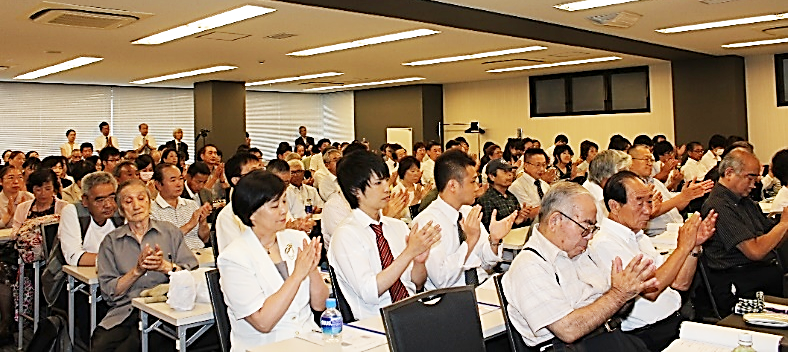
The seminar was attended by Kimilsung-Kimjongilism researchers, some 200 in all, such as scholars, workers, social activists, women and youth and students from Hokkaido, the most northern part, to Okinawa, the most southern part, which included Dr. Ogami Ken-ichi, secretary general of the IIJI; Prof. Emeritus Kamakura Takao at Saitama University who is also director of the IIJI Board; Representative Coordinator Sumiya Keizo of the Japanese National Liaison Council for the Study of Kimilsung-Kimjongilism (JNLCSKK); Prof. Emeritus Ie Masaji at Kobe City University for Foreign Studies, who is also one of Representative Coordinators of the JNLCSKK; Prof. Emeritus Taira Ken-ichi, vice-chairman of the Okinawa Liaison Council for the Study of Kimilsung-Kimjongilism; Joint Representative Miyakawa Kunio of the Gunma Liaison Council for the Study of Kimilsung-Kimjongilism; and Vice-Chairman Abe Yupo of the Ainu Association of Hokkaido.
The opening address of the seminar was made by Mr. Sumiya Keizo, being followed by guest speeches.
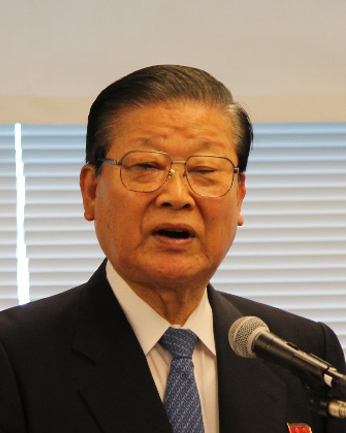
In his guest speech of solidarity, Chairman Ho Jong Man of the Central Standing Committee of the General Association of Korean Residents in Japan expressed his congratulations on the holding of the seminar and wished the seminar would contribute to the promotion in the worldwide study and dissemination of Kimilsung-Kimjongilism along with the cause of anti-imperialism and independence.
In his speech, he said as follows:
“The DPRK has been exposed to the threat of the US ‘preemptive nuclear strike ever since the agreement on a cease-fire reached in 1953, not to mention during the time of the Korean War. Under such a severe situation, President Kim Il Sung led the DPRK to a Juche-oriented socialist powerful state, which embodies independence in politics, self-sufficiency in the economy, self-defense in national defense. While facing the challenges to the DPRK in the 1990s, General Secretary Kim Jong Il, by dint of Songun politics, not only secured the socialist cause of the Korean people single-handedly, but also led them to building a nuclear power by leading the victory of ‘Arduous March.’
“Chairman Kim Jong Un chaired a new translational strategy that promotes economic construction and nuclear armed building at the same time as a permanent strategy, and then has been leading the construction of a thriving nation under the slogan of holding aloft the principle of giving priority to self-development. In such circumstances, successfully launching an intercontinental ballistic missile (ICBM) as a launch experiment on July 4, the very Independence Day of the US is one brilliant victory in the anti-imperialism, anti-US showdown over 70 years. It is a great accomplishment that strongly guarantees peace and security of the Korean Peninsula and the region.”
It was followed by another guest speech by Chairman Himori Fumihiro of the Japanese Committee for the Support of the Independent Peaceful Reunification of Korea.
In celebration of the seminar, the following message was received from the Korean Association of Social Scientists (KASS).
"We of the KASS send our warm congratulatory greetings to you all who have gathered to take part in the National Seminar on the Juche Idea for Independence and Peace.
“The study and dissemination of the Juche idea for independence and peace is a sacred cause to shape society and history, bringing about social progress.
“We of the KASS are convinced that the national seminar being held with enthusiasm of the progressives in Japan and various Juche idea study groups’ members will be a successful one that greatly contributes to the realization of the Japanese cause of independence as well as global independence and peace.”
Secretary General Ogami Ken-ichi of the IIJI introduced to the audience Prof. Ramon Jimenez Lopez, director general of the IIJI Board as follows:
“Prof. Ramon Jimenez Lopez was elected director general of the IIJI Board in 2015 after the regretful demise of Dr. Vishwanath, former honorary director general of the IIJI Board. Prof. Ramon Jimenez Lopez of mathematics at the Mexico National Institute of Technology is also playing an important role in a Mexican political party called MORENA (the Movement of National Regeneration).”
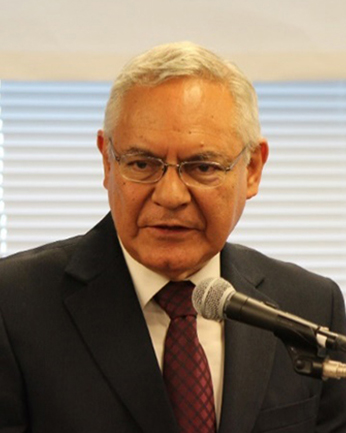
In his keynote speech Prof. Ramon Jimenez Lopez said as follows:
“Kimilsung-Kimjongilism is a political-ideological conception that is rooted in the struggle of the Korean people for obtaining their complete independence from the internal and external oppressors, and being derived from this, for achieving independence in politics, self-sufficiency in the economy, and self-reliance in national defense.
“The legacy of President Kim Il Sung, Secretary Kim Jong Il, and Chairman Kim Jong Un to the whole of humanity is the foundation, systematization and application of the Juche Idea in an effort to accomplish independence and world peace.
“The majority of the peoples and governments of the Latin American and Caribbean region, openly, clandestinely, boldly and sometimes cautiously have been waging struggles to maintain a position of being independent of US imperialism.
“In Mexico, its foundation is in the Mexican Constitution that was born by the Mexican Revolution from 1910 to 1917.
“A party called the Movement of National Regeneration (MORENA) emerged with the objectives of eliminating corruption spreading in Mexico from the oligarch-neoliberal political regimes since December 1982 and achieving the fourth Mexican major revolution.
“Mexican people like Latin America and people all over the world are standing up to fight for a better world. That is why the study and dissemination of the Juche idea is becoming more essential for the world peoples' aspiration for independence and peace to come true.”
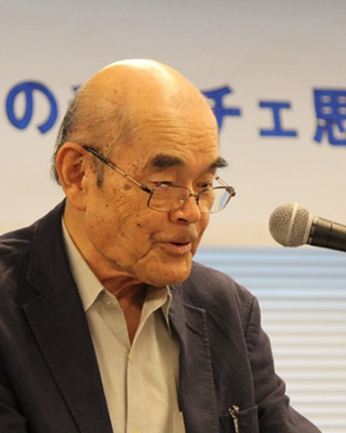
Next, Professor Emeritus Kamakura Takao gave a presentation entitled "100 Years of the Russian Revolution - Learning from Its Success and Failure", President Ri Yong Su of the Association of Korean Social Scientists in Japan, entitled "Characteristics and Historical Significance of Juche-oriented Nuclear Power”.
Referring to the causes of the success in the Russian revolution and its failure, Prof. Kamakura Takao said: the reason why the Union of Soviet Socialist Republics collapsed lay in not only the external influences that made it be exhausted in countering the threat of imperialists' invasion and war, but also due to internal causes of the Soviet Union.
Prof. Kamakura Takao ended his presentation as follows:
“Based on the elucidation of the causes of the success and failure of the Russian revolution, it is our own task to learn from this, to give a lesson and realize socialism firmly.
“Korean socialism based on the Juche idea forms a solid and voluntary unity based on the cohesion of thought and purposeful consciousness of the guiding party and the working people, and is steadily advancing socialist construction. We can confirm that the progress of Korean socialism has a universal significance for us to achieve our own tasks.”

Reporting on the characteristics of a Juche-oriented nuclear power, and the historical significance in its emergence, President Ri Yong Su mentioned said as follows:
“As Chairman Kim Jong Un mentioned about a test-fire of ballistic rocket equipped with precision guidance system last May, the DPRK has become not a simple nuclear power but a Juche-oriented nuclear power. Chairman Kim Jong Un’ s confidence and conviction shown there will be interpreted as a ‘victory declaration’ supported by the guarantee for being a nuclear power, and based on his scientific analysis on the vulnerability of the US’ policy towards the DPRK and the ground swell of global independence along with his unshakable trust in the people.”
Following the seminar, in celebration of the visit of the IIJI Director General to Japan and the success in the seminar, art performances by the Tokyo Korean Kamudan (Tr.: Tokyo Korean Music and Dancing Troupe) and Latin American music and dancing groups that are active in Japan were held.
Korean songs and dances as well as Andean music and Bolivian folk dances were presented there.
Emotions of friendship and solidarity among Latin America, Japan, and Korea were shared through those art performances.
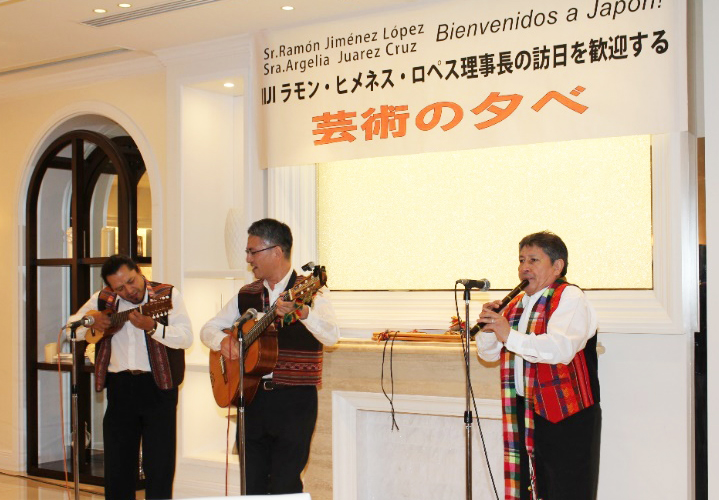
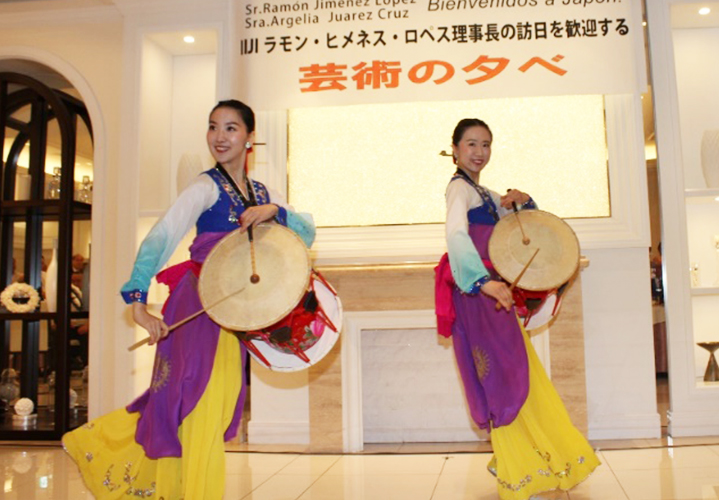
* * *
During their stay, the IIJI Director General Ramon Jimenez Lopez and his wife had opportunities to visit a publication company, nursing care establishments, a medical institution, a nursery school run by some of Japanese Juche idea researchers in an effort to apply the idea to the reality of their own and contribute to the good of the people.
Similarly, on July 23, Mr. and Mrs. Ramon Jimenez Lopez respectively held small lectures and responded carefully to questions raised by the Japanese Juche idea researchers there, thus deepening exchanges with them.
During their stay in Japan, they also went to the Central Headquarters of the General Association of Korean Residents in Japan, receiving a warm welcome by its Chairman Ho Jong Man.
After finishing a series of their visiting schedule, the IIJI Director General and his wife returned home, leaving deep reverberations to both sides or visitors and receivers.